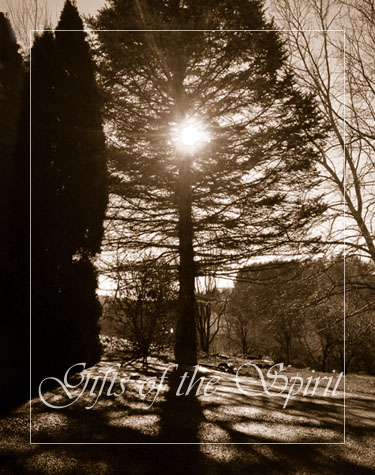
Volume XIII, Issue XXII
The Gifts of the Spirit
But a shoot shall sprout from the stump of Jesse, and from his roots a bud shall blossom. The spirit of the LORD shall rest upon him: A spirit of wisdom and of understanding, A spirit of counsel and of strength, A spirit of knowledge and of fear of the LORD (piety), And his delight shall be the fear of the LORD."
-- Isaiah 11:2,3a
A young friend of mine has been unfolding the Catechism behind the 'Twelve Days of Christmas' and it has been both fascinating and instructive. The 'Partridge in a Pear Tree' being Jesus on the cross and so it goes, most of the imagery referring to numeric imagery very familiar to the modern Church.
Coming to yesterday's 'Seven Swans a Swimming,' two images were provided, one being the Seven Sacraments, with which most of us are familiar, but the other being the Seven Gifts of the Spirit. Most of us are familiar with the Fruits of the Spirit: "But the fruit of the Spirit is love, joy, peace, forbearance, kindness, goodness, faithfulness, gentleness and self-control." listed in Galatians 5:22-23. 1 Corinthians 12 lists the Ministry Gifts of the Spirit, but the Seven Gifts of the Holy Spirit are found in Isaiah 11:2 and 3.
They are listed in the Catechism of the Catholic Church: [1.]
Wisdom: It is the capacity to love spiritual things more than material ones;
Understanding: In understanding, we comprehend how we need to live as followers of Christ. A person with understanding is not confused by the conflicting messages in our culture about the right way to live. The gift of understanding perfects a person's speculative reason in the apprehension of truth. It is the gift whereby self-evident principles are known;
Counsel (right judgement): With the gift of counsel/right judgment, we know the difference between right and wrong, and we choose to do what is right. A person with right judgment avoids sin and lives out the values taught by Jesus;
Fortitude (courage): With the gift of fortitude/courage, we overcome our fear and are willing to take risks as a follower of Jesus Christ. A person with courage is willing to stand up for what is right in the sight of G-d, even if it means accepting rejection, verbal abuse, or physical harm. The gift of courage allows people the firmness of mind that is required both in doing good and in enduring evil;
Knowledge: With the gift of knowledge, we understand the meaning of G-d. The gift of knowledge is more than an accumulation of facts, it also helps us to choose the right path through life;
Piety (reverence): With the gift of piety/reverence, we have a deep sense of respect for G-d and the Church. A person with reverence recognizes our total reliance on G-d and comes before G-d with humility, trust, and love. Piety is the gift whereby, at the Holy Spirit's instigation, we pay worship and duty to G-d as our Father, Aquinas writes;
Fear of the Lord (wonder and awe): With the gift of fear of the Lord/wonder and awe, we are aware of the glory and majesty of G-d. A person with wonder and awe knows that G-d is the perfection of all we desire: perfect knowledge, perfect goodness, perfect power, and perfect love. This gift is described by Aquinas as a fear of separating oneself from G-d. He describes the gift as a "filial fear," like a child's fear of offending his father, rather than a "servile fear," that is, a fear of punishment. Fear of the Lord is the beginning of wisdom."
The source of the traditional names of the gifts of the Holy Spirit. The Septuagint and the Vulgate read “piety” for “fear of the Lord” in its first occurrence, thus listing seven gifts.
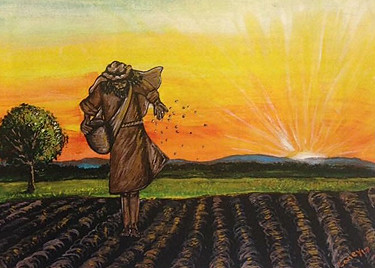
Detail from 'The Sower Prepares the Way' by Kristina Elaine Greer.
Astound the Age
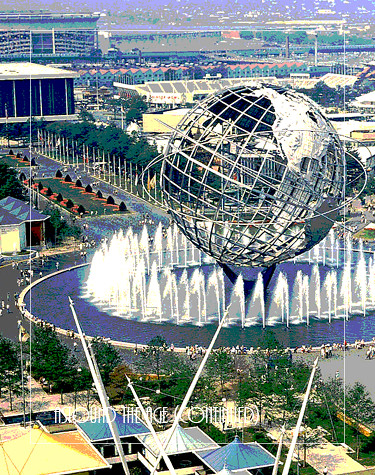
Michel Dufrénoy's Guide to Our Past Century
By Bob Kirchman
Copyright © 2017, The Kirchman Studio, all rights reserved
Chapter Four
After the Wilhelm left the Paris Canal, it sailed briskly for six days to reach New York. Lucy and Michel were married by the captain and enjoyed their ‘homeymoon cruise’ to the new world. The Wilhelm was a smaller vessel than Leviathan IV and carried freight and passengers. The staterooms could be had for a bargain so the group traveled in style compared to steerage in the larger ships. Each cabin had an ample porthole and since there was no class distinction on a freighter, the group enjoyed full access to the deck for daytime recreation. The German working man demands good victuals, so the food was better too. After life in the catacombs it was refreshing to soak in light and sea air for even a few days. The crewmen were friendly and personable.
Richelot was happily surprised at the captain’s ample supply of Rhine wines. He had expected only beer. Here he discovered another irony. The captain had a very fine collection of music discs and played Motzart and other fine composers. Captain Zimmerman remarked to the old scholar: “Funny, but the fine things of the past have been spurned by the intelligentsia but we working stiffs have now embraced them as our own. In government schools they are taught to embrace discordant harmony but you will find that in places such as this, we educate our own children. They often find a taste for the good things quite on their own.” Indeed the mess room, if you would stoop to calling it that, featured some fine Romantic paintings from the likes of Frederic Church and the other Hudson River School painters. Between meals it served as a classroom for the crews’ children. If Leviathan IV was a ‘floating city,’ Wilhelm was in itself a floating community.
Indeed there was a sense of extended family here as wives and children sailed alongside their seafaring husbands, plying artisan trades that enriched their floating village. There were manufacturers of clothing, brewers, carpenters and leatherworkers. Families taught their own children and organized athletic games for them on deck.
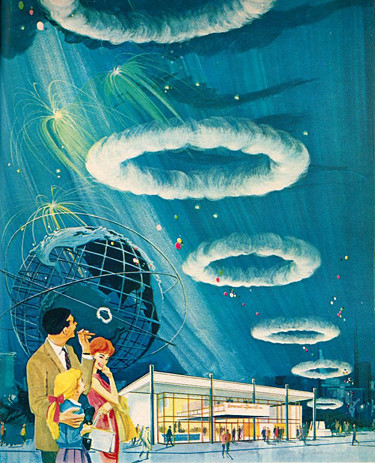
1964 New York World's Fair Painting. Artist Unknown.
Chapter Five
All too soon they made landfall in New York City’s harbor. Here towered buildings taller even than those in Paris. The Parisians wandered the Manhattan streets in a sense of awe. A train was engaged to carry them to Long Island’s village of Flushing, where they could stay in accommodations built for the 1964 Word Exposition in Flushing Meadow Park. The fair was about to open and the hotels, fearing a lower attendance at first, offered very inexpensive lodging in an effort to cut their expected losses. That is how Michel and Lucy Dufrénoy found themselves at the Fair.
Joining themselves to the first-day crowds, the young couple entered the ‘world of the future’ presented by the fair. It differed from the great World’s Fairs of the turn of the Century in several ways. First of all, the buildings were no longer in the form of a white classical city, they were generally more utilitarian. Among them was a giant ferris wheel in the form of an automobile tyre that towered above the fairgoers. There was a giant umbrella, representing an insurance company. An enormous egg towering above a forest of metal trees housed an exhibit about modern calculating machines.
There were giant boxes on stilts. Elevated trains ran on a single rail suspended above the fairgrounds. Flying machines landed and took off from the top of a large ‘T’ shaped structure. In the center of it all towered a gigantic model of the earth made from steel panels and struts. The continents were solid and the oceans described only by the meridians, which formed the structure for the massive globe. For three days the French immigrants wandered about the fairgrounds, taking in the wonders of the world. They awaited their journey by train to Montréal in French America. From there they would set out for parts unknown.

1964 New York World's Fair Painting. Artist Unknown.
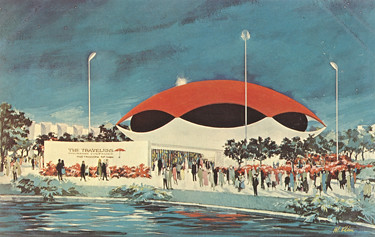
1964 New York World's Fair Painting. H. L. Klein.

1964 New York World's Fair Painting. Artist Unknown.
Chapter Six
The train made its way to Albany along the much painted Hudson River and the evening light on the water evoked those romantic images anew. From Albany, the next train made its way North to the customs house in Rouse’s Point near Lake Champlain. Then it was but a short journey further into Montréal. The travelers were disheartened to find that Vieux-Montréal, the old French center of the city, had been swallowed up in a sprawling modern metropolis much the same as modern Paris. In some regards it differed from New York only in that the language was different. There was no abundance of lodging here, however and the little group experienced their first tenement housing as they prepared to acquire land for their new settlement.
It seemed now that fortune had turned against the weary band as there was little property to be had in the rich farming lands. What remained was Northern muskeg and permafrost – land that did not promise any kind of existence past subsistence farming. Michel was charged with taking the search further out and found to his chagrin that the cost of anything that would support the colonists far outpaced their limited resources. Montréal offered little in the way of employment opportunities and the group squeaked by doing odd labor jobs as they came up.
Michel had kept correspondence with Jean Dumont, who informed him that he was headed to British Columbia to take a position with a highway builder. He would be presently traveling by airship to Montréal and then heading West by railway. “Would you like to come along, Michel, and seek opportunity for yourself where the world is expanding?”
(to be continued)
